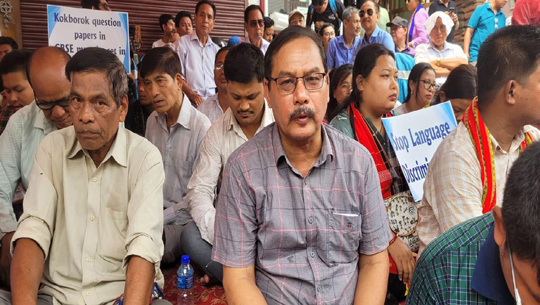In a groundbreaking display of unity, 56 tribal organizations in Tripura, under the powerful banner of ‘Roman Script for Kokborok Choba,’ have leveled explosive allegations against the government, accusing it of engaging in blatant language discrimination. The demand? Nothing short of a revolutionary adoption of the Roman script for the revered Kokborok language, aimed at empowering the state’s marginalized tribal students.
In a riveting spectacle, members from various tribal bodies converged upon Agartala, clutching defiant placards and resolute banners, as their fervent voices echoed through the city streets. Their collective disappointment soared to a fever pitch, scorching both past and present administrations for their lamentable apathy towards the long-standing plight of the Kokborok script. Even the former tribal welfare minister of the BJP-led coalition government, the indomitable Mevar Kumar Jamatia, emerged from the shadows to rally behind this audacious cause.
Jamatia, now a commanding figure within the TIPRA Motha party, did not mince words as he unleashed a scathing indictment against the previous Left Front government and the incumbent BJP regime. Accusing them of shamelessly exploiting the Kokborok language for political gains, Jamatia revealed that several esteemed commissions had unequivocally recommended the Roman script as the rightful choice for Kokborok. Shockingly, the government had turned a deaf ear, plunging the tribal community into a simmering cauldron of frustration.
Dark clouds loom as Jamatia ominously threatened to unleash a seismic upheaval if the government continues to defy the will of the tribal masses. The battle cry for the Roman script resonates as an epoch-defining endeavor, poised to safeguard and uplift the linguistic and cultural heritage of Tripura’s tribal communities.
Proponents fervently believe that embracing the Roman script will not only empower tribal students with superior educational tools but also propel the Kokborok language towards unprecedented recognition and prosperity. The government must now confront the searing pressure, compelled to address the long-festering wound of language discrimination that has plagued Tripura’s tribal communities.
As the tribal bodies fortify their peaceful protest, the destiny of the Kokborok script teeters precariously on a knife’s edge. Will the government seize this moment to embark on a redemptive journey towards inclusivity and justice? Only time will tell if the voices of the marginalized can shake the foundations of power and script a new chapter for the Kokborok language.


